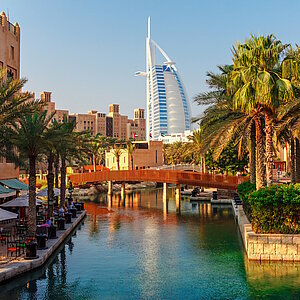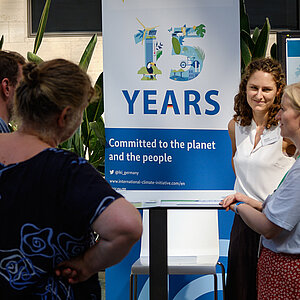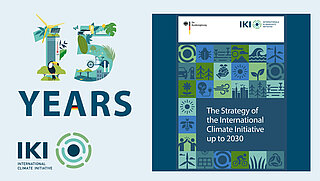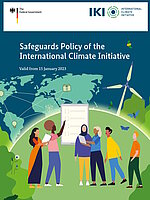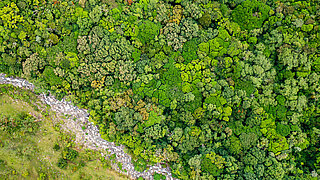A reason to celebrate: the IKI turns 15!
#15yearsIKI #IKIanniversary (as of December 2023)

Over 950 projects for climate change mitigation and biodiversity, activities in over 150 developing and emerging countries and a financial volume of almost 6 billion euros. This is the starting balance of “15 years of IKI”.
A good reason to celebrate and an even better reason to look back at the milestones and forward to the future of the IKI. What have we achieved to date, what issues are currently confronting the IKI, what aims do we want to achieve next - and who are the people behind the IKI who breathe life into it every day?
The IKI anniversary year – “Committed to the planet and the people”
The IKI’s 15th anniversary was an excellent opportunity highlight the IKI funding programme and its projects via our various communication channels under the motto “Committed to the planet and the people”.
IKI live: events in 2023
The IKI was represented at numerous events and available on site for discussions and questions about the funding programme. One focus was on events that took place place in Germany.
Not to be missed of course was the annual World Climate Summit (COP28), which was held in Dubai in December. The IKI again participated in numerous ways, and used the international framework for networking activities - and ended the anniversary year with COP28.
The IKI anniversary was also celebrated and publicised in the partner countries, notably through our interface projects in the 14 IKI priority countries.
The IKI Strategy
2008 to 2023: the challenges are growing, but the IKI is growing with them
Looking at the year 2008
2008 was marked by the global financial crisis, the 9th Convention on Biological Diversity (CBD COP) took place in Bonn, delegates met at the World Climate Summit (COP9) in Poznan in Poland and the Federal Environment Ministry launched a new funding programme, the International Climate Initiative (IKI).
The first activities were implemented in Ethiopia, Brazil and Central Asia. Since then, the programme, its portfolio, visibility and funding volume have grown steadily.
The framework conditions to ensure a constant improvement in the project quality have also grown and developed.
Selection of IKI projects 2008
- Project assessment for the exchange of know-how on climate change and water management in Ethiopia
- Master Plan to Harness CDM Biogas Potential in Rio Grande do Sul
- Programme to Improve Energy Efficiency in Mountain Villages in Central Asia
- Low Carbon Economic Zones
- Gender Justice in the Climate Debate
- Rainforest Conservation and Support for the Indigenous Population in the Amazon Basin
- Insurance Instruments for Adaptation to Climate Change
- Climate Protection in Nature-Based Tourism

The year 2022
The year 2022 was a year of change for the International Climate Initiative (IKI). For the first time, with the Federal Ministry of Economic Affairs and Climate Action, the Federal Ministry for the Environment, Nature Conservation, Nuclear Safety and Consumer Protection and the Federal Foreign Officethree federal ministries are working together to protect the climate and biodiversity within the framework of the IKI.
Learn more about the IKI year 2022 in the IKI Annual Report…
Looking at the year 2023
With the IKI Strategy up to 2030 The German Federal government redefined the future design of the IKI and consequently an important part of Germany's international climate finance.
IKI strengths: innovation, cooperation and continuity
From the outset, the IKI has focused on close cooperation in partnership with the developing and emerging countries in which it implements projects. And not only on its 15th anniversary is it becoming clear that the IKI is a permanent fixture in the funding landscape and thus a reliable partner for climate protection and the conservation of biodiversity.
At the same time, the programme is constantly evolving and is therefore responding to current developments, both in terms of theme and structure.
For example, we have been designing projects on ecosystem-based adaptation since 2011, and we have implemented projects on NDC support for partner countries even before the adoption of the Paris Agreement in 2015. The current aspects of the IKI’s work are focusing on, for example, climate-friendly financial flows (e.g. divestment strategies), agri-photovoltaics and the resilience of Pacific island states.
Since 2017, the funding structure of the IKI has included thematic calls whereby large-volume projects are funded that tackle urgent issues and since 2018 there are country calls for the targeted bilateral funding in specific partner countries. The IKI Small Grants and the IKI Medium Grants were launched in 2019.
The same applies to all IKI activities, regardless of the topic or approach of the respective selection procedure: functioning approaches that contribute to climate change mitigation and biodiversity conservation should be made visible and disseminated to ensure the maximum impact of the funding programme.
IKI priority countries
The selection of the priority countries resulted from an evaluation of the IKI, which had indicated a stronger country orientation. Currently, the IKI works particularly closely with Brazil, China, Colombia, Costa Rica, India, Indonesia, Mexico, Peru, the Philippines, South Africa, Thailand, Turkey, Ukraine and Vietnam. In most countries, cooperation takes the form of larger, particularly bilateral project portfolios.
The IKI – a retrospective
Click on the timeline to take a short journey through the years 2008 to 2023 to learn about some of the IKI's most important milestones:
Publications: Values and responsibility of the IKI
-
 01/ 2023 | IKI values
01/ 2023 | IKI valuesSafeguards Policy of the International Climate Initiative
English (PDF, 3 MB, barrier-free)
Reports from the IKI
We now have over 200 video reports produced in cooperation with Deutsche Welle (the German public, state-owned international broadcaster) that provide some insights into the work of the IKI projects since 2008:
The link has been copied to the clipboard




